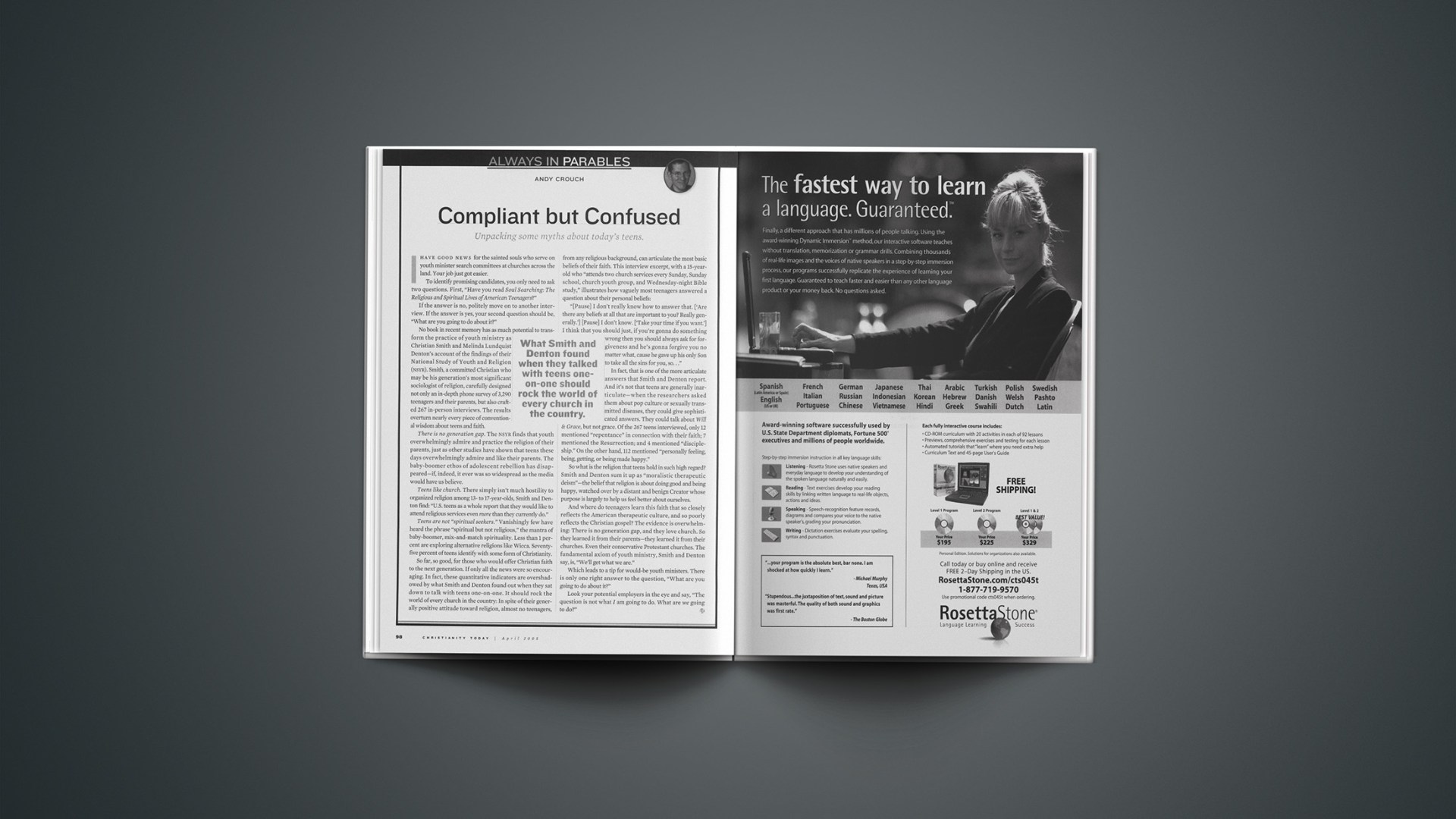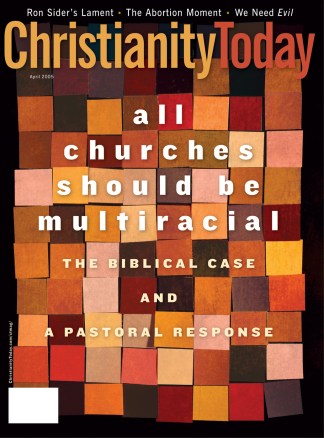I have good news for the sainted souls who serve on youth minister search committees at churches across the land. Your job just got easier.
To identify promising candidates, you only need to ask two questions. First, “Have you read Soul Searching: The Religious and Spiritual Lives of American Teenagers?”
If the answer is no, politely move on to another interview. If the answer is yes, your second question should be, “What are you going to do about it?”
No book in recent memory has as much potential to transform the practice of youth ministry as Christian Smith and Melinda Lundquist Denton’s account of the findings of their National Study of Youth and Religion (NSYR). Smith, a committed Christian who may be his generation’s most significant sociologist of religion, carefully designed not only an in-depth phone survey of 3,290 teenagers and their parents, but also crafted 267 in-person interviews. The results overturn nearly every piece of conventional wisdom about teens and faith.
There is no generation gap. The NSYR finds that youth overwhelmingly admire and practice the religion of their parents, just as other studies have shown that teens these days overwhelmingly admire and like their parents. The baby-boomer ethos of adolescent rebellion has disappeared—if, indeed, it ever was so widespread as the media would have us believe.
Teens like church. There simply isn’t much hostility to organized religion among 13- to 17-year-olds, Smith and Denton find: “U.S. teens as a whole report that they would like to attend religious services even more than they currently do.”
Teens are not “spiritual seekers.” Vanishingly few have heard the phrase “spiritual but not religious,” the mantra of baby-boomer, mix-and-match spirituality. Less than 1 percent are exploring alternative religions like Wicca. Seventy-five percent of teens identify with some form of Christianity.
So far, so good, for those who would offer Christian faith to the next generation. If only all the news were so encouraging. In fact, these quantitative indicators are overshadowed by what Smith and Denton found out when they sat down to talk with teens one-on-one. It should rock the world of every church in the country: In spite of their generally positive attitude toward religion, almost no teenagers, from any religious background, can articulate the most basic beliefs of their faith. This interview excerpt, with a 15-year-old who “attends two church services every Sunday, Sunday school, church youth group, and Wednesday-night Bible study,” illustrates how vaguely most teenagers answered a question about their personal beliefs:
“[Pause] I don’t really know how to answer that. [‘Are there any beliefs at all that are important to you? Really generally.’] [Pause] I don’t know. [‘Take your time if you want.’] I think that you should just, if you’re gonna do something wrong then you should always ask for forgiveness and he’s gonna forgive you no matter what, cause he gave up his only Son to take all the sins for you, so…”
In fact, that is one of the more articulate answers that Smith and Denton report. And it’s not that teens are generally inarticulate—when the researchers asked them about pop culture or sexually transmitted diseases, they could give sophisticated answers. They could talk about Will & Grace, but not grace. Of the 267 teens interviewed, only 12 mentioned “repentance” in connection with their faith; 7 mentioned the Resurrection; and 4 mentioned “discipleship.” On the other hand, 112 mentioned “personally feeling, being, getting, or being made happy.”
So what is the religion that teens hold in such high regard? Smith and Denton sum it up as “moralistic therapeutic deism”—the belief that religion is about doing good and being happy, watched over by a distant and benign Creator whose purpose is largely to help us feel better about ourselves.
And where do teenagers learn this faith that so closely reflects the American therapeutic culture, and so poorly reflects the Christian gospel? The evidence is overwhelming: There is no generation gap, and they love church. So they learned it from their parents—they learned it from their churches. Even their conservative Protestant churches. The fundamental axiom of youth ministry, Smith and Denton say, is, “We’ll get what we are.”
Which leads to a tip for would-be youth ministers. There is only one right answer to the question, “What are you going to do about it?”
Look your potential employers in the eye and say, “The question is not what I am going to do. What are we going to do?”
Copyright © 2005 Christianity Today. Click for reprint information.
Related Elsewhere:
Our sister publication, Books & Culture, interviewed Smith about his findings.
Soul Searching is available from Amazon.com and other book retailers.
More about Christian Smith is available from his website at UNC.
Earlier Andy Crouch columns for Christianity Today include:
When Backward Is Forward | Christmas may be the best argument against genetic enhancement. (Dec. 23, 2004)
Salt-and-Pepper Politics | Choosing between candidates whose consciences are too clean. (Oct. 04, 2004)
‘Live More Musically’ | The difference between Christian practice and a Starbucks purchase. (July 29, 2004)
The Cruel Edges of the World | There are some places that bring the distant biblical text closer to our lives. (June 07, 2004)
Pilgrims to Nowhere | Freedom isn’t much good if you don’t have a sense of direction. (March 30, 2004)
Glittering Images | A profound Christian rethinking of power is overdue (Feb. 17, 2004)
Before the Deluge | All of us have a sexual orientation that bends toward the self. (Dec. 03, 2003)
Two Weddings and a Baptism | It’s still impossible to predict what will advance the gospel in Hollywood. (Oct. 15, 2003)
Wrinkles in Time | Botox injections as a spiritual discipline. (Aug. 11, 2003)
Rites of Passage | Self-improvement is our culture’s most durable religion. (June 6, 2003)
Christian Esperanto | We must learn other cultural tongues. (June 4, 2003)
We’re Rich | But why is it so hard to admit? (Feb. 20, 2003)
Blinded by Pop Praise | To see God “high and lifted up,” just open your eyes. (Dec. 17, 2002)
The Future Is P.O.D. | Multicultural voices have an edge in reaching a rapidly changing America. (October 12, 2002)
Rekindling Old Fires | We can resist technology’s chilling effects on how we spend time together. (August 2, 2002)
Interstate Nation | The national highway system is a lesson in how to transform a nation. (June 21, 2002)










